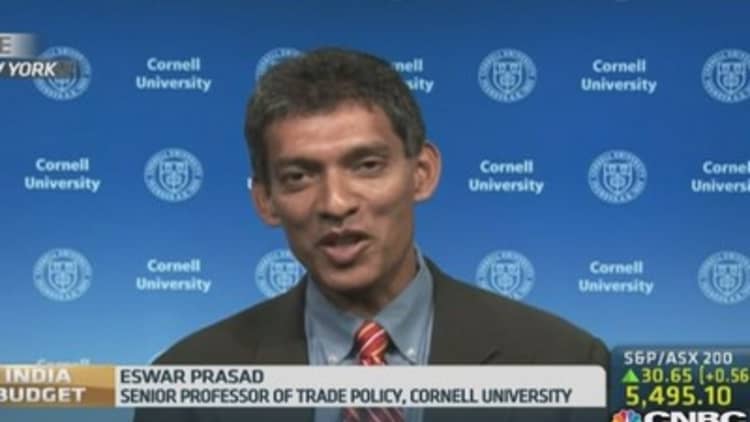The first budget under new Indian Prime Minister Narendra Modi widely met expectations, but not all India watchers were satisfied.
"Infrastructure, growth, and jobs were all covered … but the delivery of the speech could have been more inspirational," Sam Gupta, CIO of Grand Trunk Capital, an India-focused fund, told CNBC.
The 2014/2015 budget was widely seen by some as Modi's big moment to invigorate frustrated Indian citizens who have lost hope in India's economic growth story, as well as send a message to foreign investors that India is ready for business.
Read MoreGrisly India murders show social strains in Modi's India
"This was far from the game changer more optimistic souls had been waiting for," wrote Tom Hester, head of Asia Equity Sales at BNP Paribas.
"The budget seems incremental rather than transformational—and the lack of a strong response from the stock markets or from political opponents is evidence of this," said Jonah Blank, senior political scientist at Rand Corporation, to CNBC.

Others said that some of the financial targets set by the Indian government were overly optimistic.
In a research note, Goldman Sachs said: "we think that the FY15 fiscal deficit target of 4.1 percent of GDP may be difficult to achieve given optimistic assumptions on revenue growth, and 4.3 percent of GDP may be a more realistic number."
Fiscal consolidation and structural reforms were main agenda items for India Finance Minister Arun Jaitley, who presented the budget.
Jaitley unveiled a series of measures, including plans to boost defense and infrastructure spending—two areas that market watchers were expecting the government to put money toward.
Read MoreIs Carrefour's India exit a setback for Modi?
Tax reform, as expected, was also a big focus. In an effort to simplify the complicated tax structure levied on local and foreign firms, Jaitley said the Indian government plans to implement a goods and services tax, or GST, by year end.
The GST was well received by business leaders, like Karan Chanana, chairman and CEO of Amira Nature Foods, a company that processes and sells Indian Basmati rice and ready-to-eat snacks, among other products, to customers around the world.
Chanana told CNBC "the plan to implement a GST tax enables India to be a common market …which is ultimately good for business."
What it means for markets
But the GST remarks were not enough to keep investors enthused. The Bombay Sensex was lower Monday, marking its fifth straight day of declines.
BNP Paribas told clients: "in equity-land given the prevailing optimism and strong performance in the last 10 months I see no reason to amend my inclination to trim hugely outperforming second- tier stocks and to consolidate toward underperforming quality names."
But Gupta of Grand Trunk Capital said a selloff or correction in Indian equities wouldn't be the worst thing given the run-up in the market this year.
"It will allow money that is sitting on the sidelines to finally get in," he said.
—By CNBC's Seema Mody


